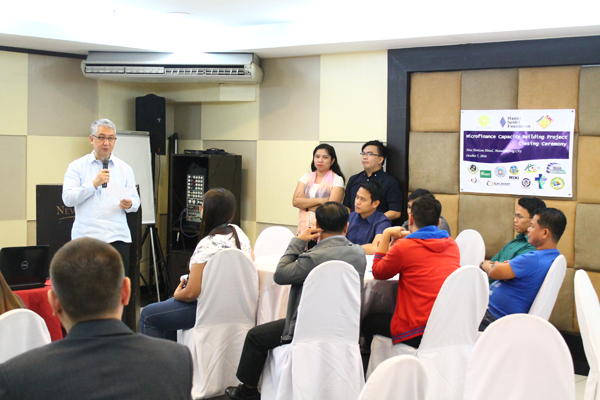Microfinance Capacity Building Project Turnover and Closing Ceremony

HSF
The project cooperation was jointly implemented by PinoyME Foundation (PMEF) and Ninoy and Cory Aquino Foundation (NCAF) in close cooperation with key microfinance institutions and regional microfinance councils, as well as major academic institutions in different areas of the country. The Microfinance Capacity Building Project, which run for nine (9) years, was supported by the Hanns Seidel Foundation/Germany (HSF).
PinoyME’s President and CEO, Mr. Danilo Songco, delivered the Welcome Remarks and expressed his gratitude to HSF as well as key partners and stakeholders for the beneficial cooperation. Mr. Sabino presented the Project Accomplishments over the years. Testimonials from MF Tech graduates, partner educational institutions and microfinance institutions (MFIs) were shared.
The invaluable contributions of Dual Training System (DTS) experts and other support institutions who have shared their time and expertise in setting up the program requirements, including the curriculum, competency standards, self-contained modules, on-the-job training, competency assessment instruments, trainers’ training, training regulations, monitoring and evaluation, among others, were recognized.
Moreover, the project partnership expressed its appreciation to relevant government agencies, namely, the Technical Education and Skills Development Authority (TESDA) and the Commission on Higher Education (CHED), for giving guidance and official recognition to the one-year dualized Microfinance Technology Program under TESDA and the 4-year ladderized Microfinance Course under CHED.

HSF
It was a meaningful journey for everyone towards the goal/objectives of (i) greater access of the poor to micro-credit, (ii) increased outreach of MFIs, (iii) enhanced social relevance of education institutions (EIs), and (iv) addressing human resource requirements of the microfinance industry with competent MF professionals in partnership with academic institutions through capacity building of microfinance institutions (MFIs) based on continuous research and development.
Consistent with the purpose of the German model’s dual training system, which was adapted in the Philippines with its enactment into law in February 1994 by former President Fidel Ramos, the project cooperation contributed to the economic growth and development of the country through job generation and poverty alleviation, alongside other DTS programs supported by HSF in the past.
The program partners and key stakeholders value the continued support and participation of the microfinance program’s students and graduates -- who are well-trained, highly-skilled and professional workers, since the program was offered in 2009.
Mr. Götz Henicke, HSF Resident Representative in the Philippines delivered the Closing Remarks and thanked the PinoyME, NCAF, the participating MFIs and the microfinance industry as a whole, the educational institutions and training centers, program graduates, and other stakeholders for the successful cooperation. He expressed appreciation to the positive feedback shared by the partners and inspiring testimonials from direct participants/beneficiaries of the program cooperation.
Plaques of Appreciation were awarded to the institutional partners in recognition of their valuable contribution to the project.
